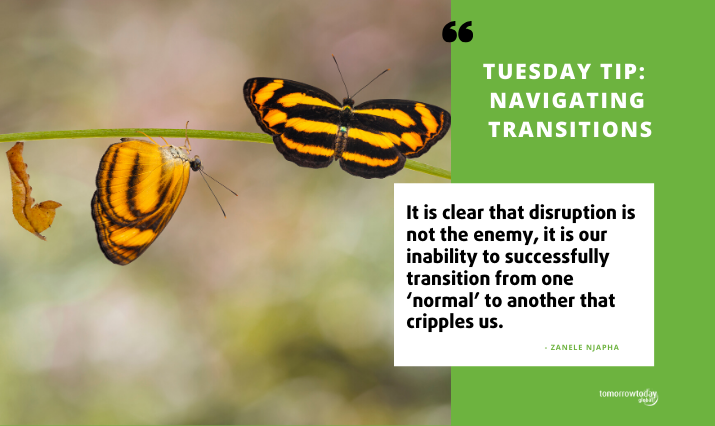Whether you know it or not, you are constantly partaking in transitions. They are an undeniable way of life, in both our personal lives and our lives as professionals.
The seamlessness of a transition affects how successful individuals and businesses are under disruption.
It is becoming clear that disruption is not the enemy, it is our inability to successfully transition from one ‘normal’ to another that cripples us and unlearning can assist.
Change occurs constantly, but as William Bridges implies, change is what occurs structurally.
When a cabinet is shuffled around, you change offices or the department manager position is given to a new individual: these are changes because they relate to a shift in structure. Transitions, on the other hand, are more psychological and are the process that individuals involved in a given change, go through to successfully complete it.
Have you ever heard someone say “just because x happened, don’t think that things have changed?”
Transitioning is a process that is made up of both letting go and grabbing hold of. This is often why structural changes such as mergers do not occur successfully. Letting go is the very first part of successful transitions, but is immensely challenging, considering the loss associated with letting go of the familiar.
The final part of a successful transition is the grabbing hold. Grabbing hold implies embracing the ‘new’ with anticipation, clarity and hope.
Take the example of a trapeze artist. These highly skilled individuals fly through the air and engage with limited tools such as each other’s bodies and bars, swings and hoops. The excitement of watching a trapeze artist perform his or her craft lies in the leaps and tricks. The artist may swing on one bar for a minute and then fling themselves into the air, perform a twist mid-air and then almost instinctively grab hold of a fellow catcher’s hands on the way down.
It is exciting to behold, but also quite unnerving, because although they may let go of the bar successfully, often our biggest moment of terror lies in those few seconds they are in the air as they prepare to grab hold of their next support.
This is the middle phase of a transition and often where many individuals and organisations get terribly stuck.
Structural changes that require transitioning occur continuously both in our personal and professional lives.
A few personal examples;
- Transitioning to and from different grades at school
- Graduation and entering the workforce
- Moving out of the nest
- Getting married or getting divorced
- Having a baby
Take a few minutes to think about how the above transitions occurred in your life and how although things had structurally changed, you had to engage in an unseen process to reorient. Now, have a look at the below examples from a more professional standpoint;
- Getting a new account/ client or changing functions/ departments
- Having some form of leadership change
- Company mergers
- Retirement
So what can you do about it?
If you have experience with any of the above, you will know just how challenging, but also necessary it is for transitions to take place in order for structural changes to be successful. That is why UnLearning is the solution to helping individuals and organisations navigate transitions in changing environments.
Transitions are uncomfortable and this often dissuades and discourages teams from transitioning successfully. A framework that our team would love to share with our clients is Navigating Transitions, this presentation (which can be done virtually as a keynote or workshop), uses ambiguity exercises to introduce this discomfort or confusion and then encourages teams to see the discomfort for what it is – an invitation to unlearn and cross over. The presentation makes clear why the discomfort exists and why we often fail to transition in its presence.
UnLearning approaches transitions with a known to unknown strategy. We understand that the biggest hurdle with transitions is an anxiety around what we do not know, and how that takes us away from the familiar.
Using key principles of UnLearning, the presentation and workshop helps teams take stock of who they were, understand their power and successfully grab hold of a new identity.
_________________________
References:
- Bridges, W 1991, Managing Transitions: Making The Most of Change, Hachette Books, Michigan.
______________________
About the author of today’s Tuesday Tip – Zanele Njapha
In the face of disruptive change, Zanele assists organisations to navigate various transitions and become future-fit by cracking the unlearning code.
She does this by facilitating the understanding that learning, unlearning and relearning must be the crux and heart of an organisation’s DNA if they are serious about sustained relevance in a shifting climate.
Email [email protected] for more information or to request ‘Navigating Transitions’ for your team as a presentation or workshop.



Trackbacks/Pingbacks